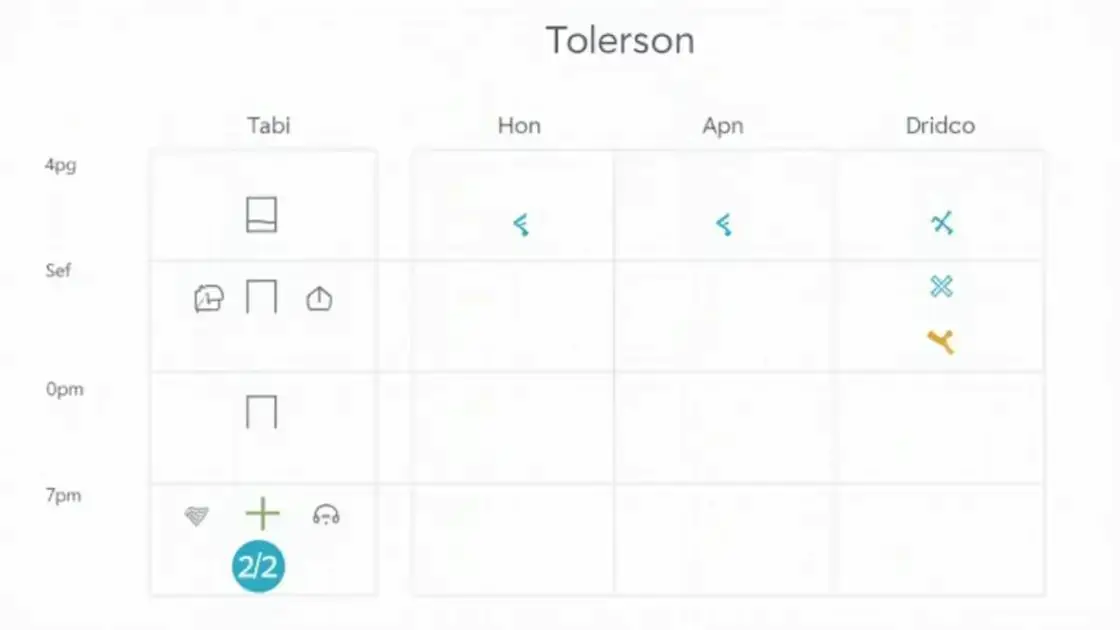Regularly checking your progress on fitness goals is essential for success; it helps you stay motivated, identify areas for improvement, and make necessary adjustments based on insights gathered from tracking methods, such as journals and fitness apps.
Regularly checking your progress on fitness goals is essential for success. It allows you to stay motivated and focused on achieving your objectives. When you monitor your advancements, you can celebrate your achievements, identify areas that need improvement, and adjust your strategies accordingly. This article will delve into why tracking progress matters, effective methods to check your fitness goals, how often to review them, and how to adjust your goals based on the insights gathered.
Why Tracking Progress Matters
![]()
Tracking progress is crucial because it serves as a roadmap for your fitness journey. Without clear benchmarks, it’s easy to lose sight of your goals or get discouraged by a lack of visible results. By consistently monitoring your performance, you can identify what works, what doesn’t, and make necessary adjustments.
Stay Motivated
When you see the improvements you’re making, whether it’s lifting heavier weights, running faster, or completing more reps, your motivation will increase. You are more likely to stick to a routine when you are aware of your progress.
Identify Areas for Improvement
Tracking your progress allows you to analyze your performance critically. Perhaps you’re not improving in a specific area like strength or endurance. Regular checks give you the chance to tweak your training plan to address these weaknesses.
Achieve Tangible Results
Setting specific milestones and tracking their completion can help you feel a sense of accomplishment. Each small victory makes the larger goal seem more achievable and can provide the drive to keep pushing forward.
Adapt to Changing Needs
As you progress in your fitness journey, your goals may change. Regular assessment enables you to adapt your objectives, ensuring they remain challenging yet achievable. This adaptability is vital to long-term success and satisfaction with your fitness routine.
Effective Methods to Check Your Fitness Goals

There are various effective methods to check your fitness goals. Each method can provide insights into your progress and help keep you motivated. Here are some strategies you can use:
1. Keep a Workout Journal
Writing down your workouts helps track your progress over weeks and months. You can note the exercises, sets, reps, and even how you felt during each session. This record allows you to see patterns in your performance and make necessary adjustments.
2. Use Fitness Apps
Fitness apps can simplify tracking your goals. Many apps allow you to log your workouts, monitor your nutrition, and set reminders. They often include features for tracking your weight loss or muscle gain over time.
3. Regular Fitness Assessments
Schedule regular fitness assessments every few weeks. This could involve measuring your body composition, timing a run, or testing your strength with specific exercises. These evaluations give you concrete data to see how much you’ve improved.
4. Set SMART Goals
Set specific, measurable, attainable, relevant, and time-bound (SMART) goals. This framework makes it easier to track progress and stay focused. When you know what you want to achieve, checking your advancement becomes simpler.
How Often Should You Review Your Progress?

Reviewing your progress is essential for staying on track with your fitness goals. But how often should you do it? The frequency of reviews can vary based on your individual objectives and training style.
Weekly Check-Ins
For many individuals, weekly check-ins can be very beneficial. This doesn’t have to be a lengthy process. You can quickly assess your workouts, nutrition, and overall feelings in a journal or app. Weekly reviews allow you to spot trends and make necessary changes more efficiently.
Monthly Assessments
Monthly assessments can be more in-depth. During these sessions, consider tracking specific metrics like body weight, fat percentage, or fitness levels in various exercises. This method provides a broader picture of your progress and helps you understand long-term trends.
Quarterly Reviews
For those with more established fitness routines, quarterly reviews may suffice. Every three months, reassess your overall goals, progress, and any needed adjustments. Use this time to reflect on what you’ve accomplished and set new targets.
Listen to Your Body
Lastly, it’s important to listen to your body. If you feel stuck or unmotivated, it might be time for a review—even if it’s not the scheduled time. Regularly tuning into how you feel can guide you on when to check your progress.
Adjusting Goals Based on Progress Insights

Adjusting your goals based on progress insights is an important part of any fitness journey. When you monitor your progress, you gain valuable information that can help guide your next steps.
Evaluate Your Current Goals
Start by evaluating your existing goals. Are they still relevant? If you’ve reached a milestone, it’s time to set a new one. For example, if your goal was to lose 10 pounds and you achieved it, you might want to set a new target related to building muscle or improving endurance.
Recognize Patterns in Your Progress
Look for patterns in your progress data. If you notice consistent failures to reach certain milestones, it may indicate that those goals are unrealistic. Adjust them to be more attainable while still challenging.
Celebrate Achievements
Celebrate your achievements to keep your motivation high. This can be as simple as recognizing when you’ve improved a personal record. Use these moments to adjust your goals. Maybe you’ve grown stronger than you realized, and it’s time to set a higher weightlifting target.
Stay Flexible and Adaptable
Being flexible and adaptable is key. Life can change, and sometimes your priorities shift. If you’re feeling overwhelmed or unmotivated, it may be necessary to adjust your goals to fit your current lifestyle and mental state. Goals should empower you, not stress you out.
Wrapping Up the Importance of Progress Tracking
Regularly checking your progress on fitness goals is essential for long-term success. By understanding why tracking matters, utilizing effective methods, setting a proper review schedule, and adjusting goals based on insights, you pave the way for achieving your fitness aspirations.
As you engage in this process, remember that fitness is a journey. Your goals may evolve, and that’s perfectly fine. Stay motivated by celebrating your achievements, recognizing when to adjust your objectives, and appreciating your hard work.
Make checking your progress a routine part of your fitness journey, and you will find yourself more engaged and successful in reaching your desired outcomes.
FAQ – Frequently Asked Questions about Checking Fitness Goals
Why is tracking my progress on fitness goals important?
Tracking progress helps you stay motivated, identify areas for improvement, and recognize your achievements on your fitness journey.
How often should I review my fitness goals?
You should review your fitness goals weekly for quick insights, monthly for in-depth assessments, and quarterly for overall evaluations.
What methods can I use to check my fitness progress?
You can keep a workout journal, use fitness apps, conduct regular fitness assessments, and set SMART goals.
How do I know if my goals need adjustment?
If you’re consistently hitting or missing your targets, or if your circumstances change, it’s a good time to reevaluate and adjust your goals.
Can I celebrate small milestones in my fitness journey?
Absolutely! Celebrating small achievements keeps you motivated and makes the larger goals feel more attainable.
What should I do if I feel overwhelmed by my fitness goals?
If you feel overwhelmed, consider adjusting your goals to make them more manageable and reflect your current ability and circumstances.













